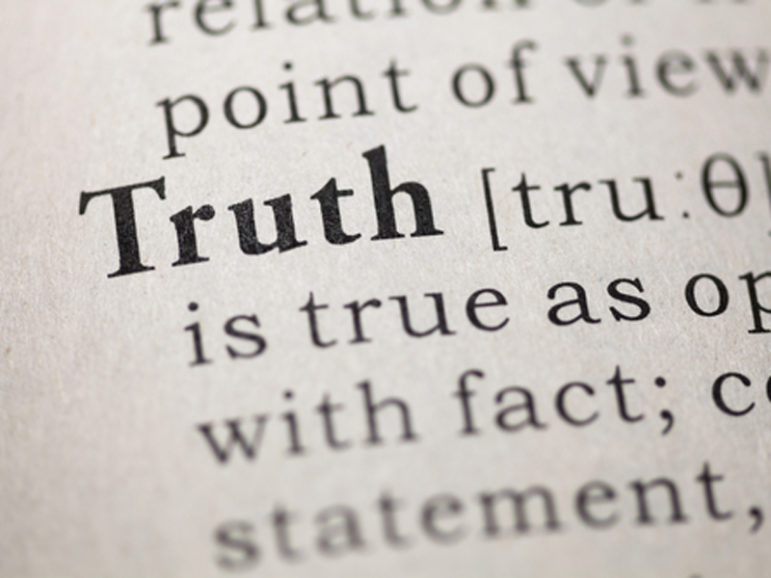Words still matter. The concept of truthfulness still resonates. The ethics of speech remains intuitively important to many people.
These are not high ideals, but foundational necessities for any decent human community.
Words still matter. It has been revealed again during this presidential campaign. The trustworthiness ratings of Donald Trump and Hillary Clinton are as low as they are in part because of their sins against the truth, and more broadly (for Mr. Trump), their sins against other aspects of the ethics of speech.
But the fragility of any shared conception of truth, and any shared ethics of speech, has also been revealed during this election campaign. It’s a glass-half-full, glass-half-empty situation. We are genuinely at risk of becoming a society in which there is no such thing as truth. This must be opposed with every fiber of our collective being.
Start with the basic moral norm that the statements people make should be truthful, that is, should correspond with reality. Words have a basic range of meanings, and the words-with-meanings that we deploy should correspond with a reality external to us.
This standard is itself questioned, at least in academia, because fewer and fewer philosophers are willing to accept what is called a “correspondence theory of truth.” They are not confident that there is this thing called “reality,” existing out there in the world, to which all relevant statements must correspond, but instead believe in the centrality of individual perspective and social location.
But we ought to be able to agree on this at least, that everyday human relationships depend on something like the correspondence theory of truth, as well as the ability to trust that most people most of the time will make statements that attempt to correspond with reality.
So if I say “I have a net worth of $4.5 billion dollars,” then this means that a neutral accountant could look at my financial records and come up with a figure near that amount. If this is not true, I do not make that statement.
If I say, “I saw thousands cheering as the (Twin Towers) came down” on 9/11, then this statement needs to correspond with a reality external to my imagination. If this is not the case, I do not make that statement.
If I say, “Director Comey said my statements were truthful,” then this means that the FBI director offered an authoritative statement to that effect. If this is not true, I do not make that statement.
If I say, “Obama founded ISIS,” then this means that if investigators had access to all relevant information, they would be able to report that President Obama actually was involved in everything we associate with the basic range of meanings of the word “founded,” such as conceptualization, recruitment, planning, funding, and early operations. If this is not true, I do not make that statement. It is not the same kind of statement as “Obama’s policies contributed to the emergence of ISIS.”
Some statements are promises. This means that I am pledging to do something, or refrain from doing something, in the future.
Such promises can only be shown to correspond with reality based on future actions. But still, everyday human relationships depend on the ability to trust that most people most of the time will keep the promises that they make, and in a reasonable amount of time.
So if I promise to give all the proceeds of this event to veterans’ groups, then within a reasonable time I need to give the proceeds to veterans’ groups.
And if I promise to turn over all requested emails, then within a reasonable time I need to turn over all requested emails.
Another aspect of the ethics of speech is the recognition of its power to bless or to harm, and the responsibility to use that power wisely. This is true of all speech, but especially public speech.
So if I say, “I’d like to punch him in the face,” related to a protester at an emotional public rally, I am using the power of public speech to invite harm against this particular person or others identified as similar.
But if I say, “It’s time we treated the people who educate our children with … respect,” I am using a public platform to bless a group of people, motivating them and inspiring gratitude and fellow feeling. This is a positive use of the power of public speech.
Another element of the ethics of speech is awareness of the dangers of verbal misdirection, deception, innuendo, half-truths, and sarcasm. These are sins of speech in which a bold-faced lie is not told, but speech, or listeners, are manipulated, in order to accomplish a desired goal. But this is done in a manner in which one can with bare plausibility claim innocence of intent or action. Examples abound.
In “Kingdom Ethics,” the textbook I co-authored with the late Fuller Seminary ethicist Glen Stassen, we propose that an implicit covenant of speech is at play in all relationships. I have just outlined some of its elements: Speech should be truthful, promises should be kept, the power of speech should be used wisely, and speech should be direct, fully truthful, and non-manipulative.
Speech reveals character.
Those who routinely sin with words reveal holes in their character that we must take seriously. When we encounter people who reveal a chronic inability to keep the basic ethics of speech, the rest of us learn not to trust them.
We certainly learn not to entrust anything important to them, including, for example, the federal government.





